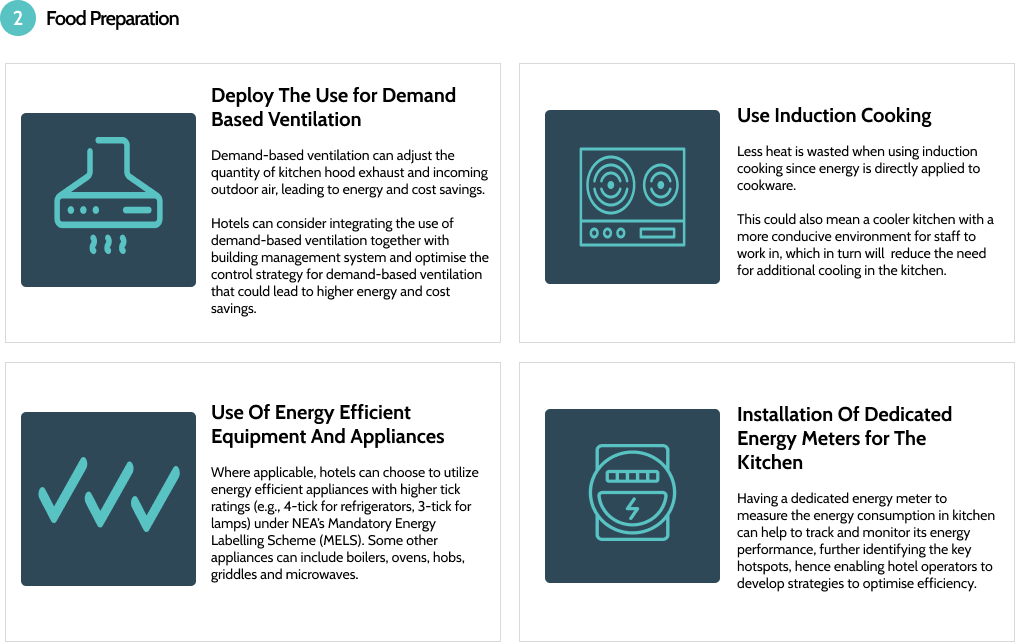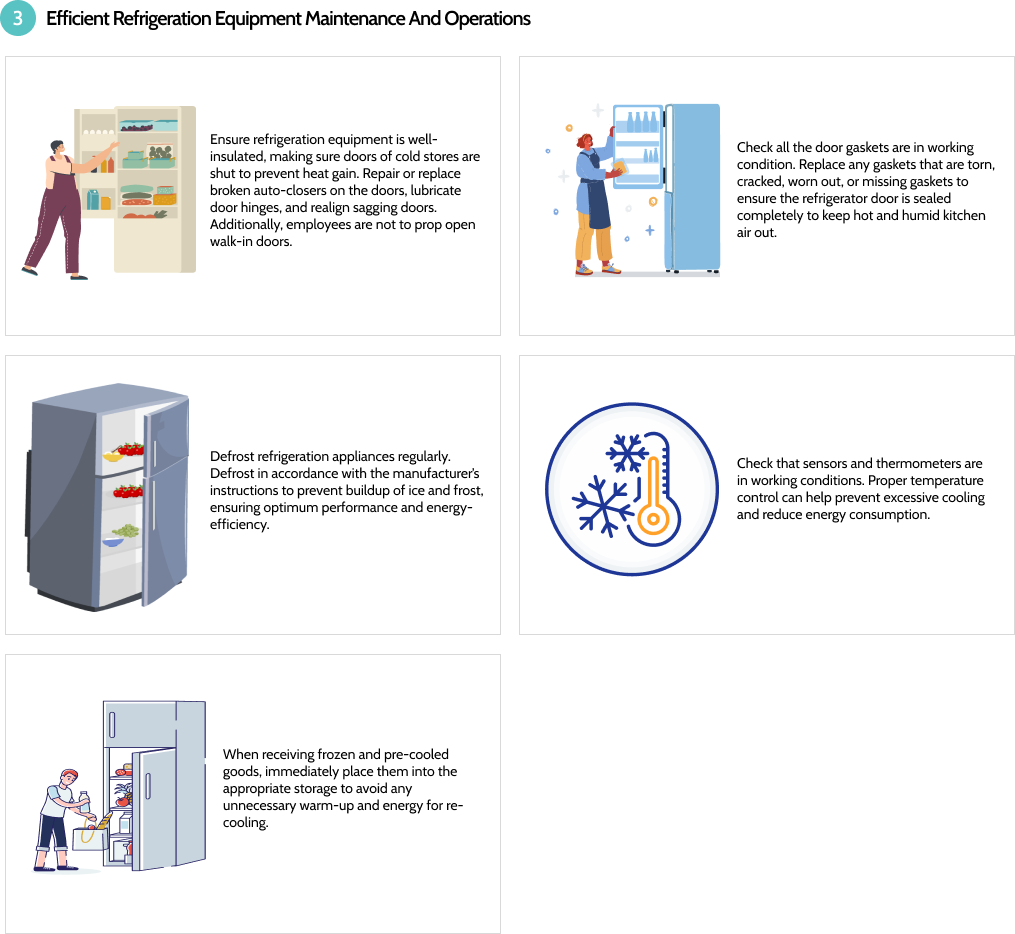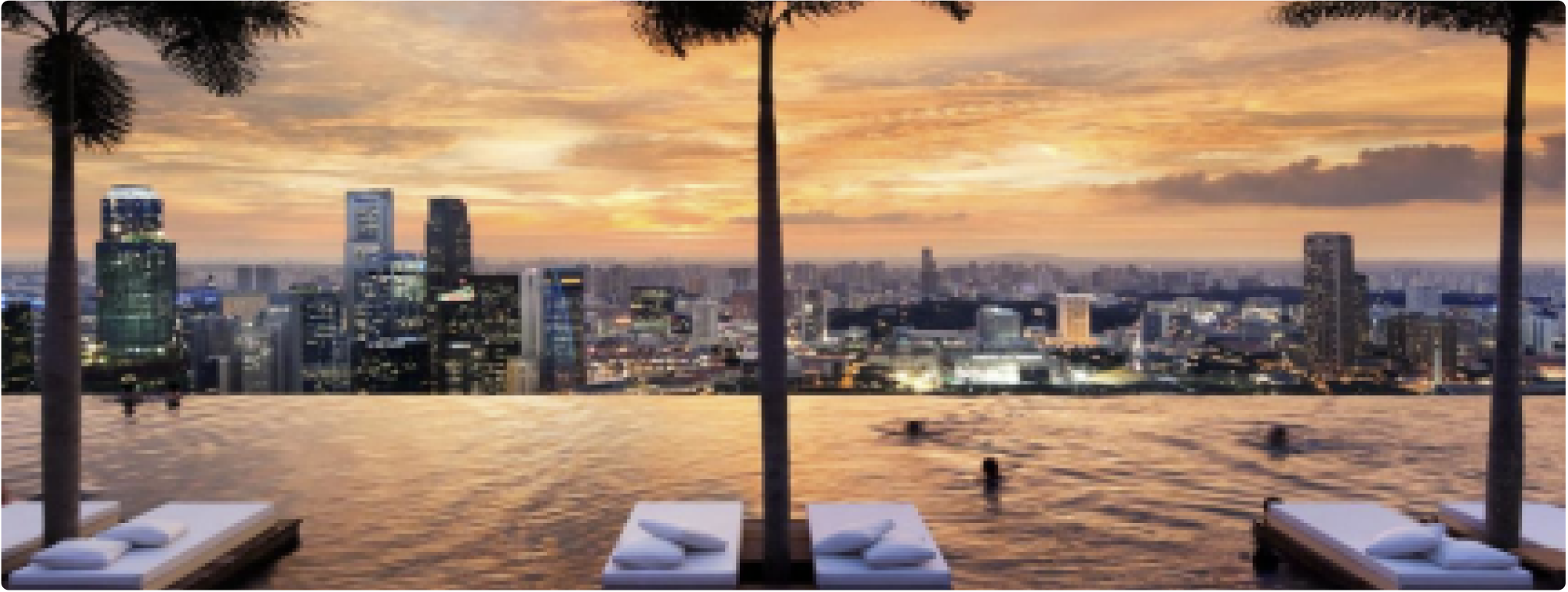
Hotels that offer event spaces and F&B services typically utilize large energy-consuming appliances such as air conditioning, lightings and cooking equipment, resulting in substantial energy consumption.
Hence for purpose of conservation, we recommend analysing the current state of energy use during events and F&B services within the hotels by conducting an energy audit. The gathered audit insights are imperative in highlighting areas of concerns that have high energy consumption. Once these energy hotspots have been determined and clearly identified, hotels will then be able to develop and construct solutions to manage energy consumption with efficacy. These solutions include:
These solutions include:
|
| Solutions: Improving energy efficiency, refrigeration, conducting regular maintenance, implementing good habits and practices |
| Educate: Active educational engagements with staff and guests on energy conscious behaviors | |
| Monitor and Review: Implementation of water monitoring systems, and conduct regular checks on meters or related information systems to effectively manage hotel’s water usage and consumption in a strategic and orderly manner |
Global Best Practices
General Audit
Increasingly, more event planners and consumers are seeking sustainable venues for their events. As events are generally energy intensive, it is important to conduct a comprehensive energy audit in order for hotels to better understand their consumption pattern.
With the audit data, hotels can develop solutions to effectively manage their energy usage at the venue and in F&B services. For some hotels, they go the extra mile by calculating associated emissions such as travel and transportation that are related to the event.
The F&B services audit should provide a breakdown of the energy consumption specific to food management such as food preparation, catering services, refrigeration lighting and ventilation in the kitchens. With a comprehensive audit on energy management for events and catering services, hotels will be able to develop targeted solutions to optimise energy usage to achieve a reduction in energy consumption.
Typically, an audit process consists of a few main steps. Some of these steps may vary in different industries and sectors, however, the general flow remains the same.

Solutions
Based on the audit insights gathered, hotels can identify opportunities to deploy a variety of solutions to achieve higher energy efficiency. This includes well-considered retrofits on fixtures, systems and equipment, raising hotel staff and guests’ awareness through education, and the implementation of energy management systems to track, monitor and review their energy consumption levels.
Here are the common solutions for energy management in events and F&B services. Do note that the list provided is non-exhaustive.
Note: Some of the solutions for reducing energy consumption at event venue are also covered in Operations management – energy section. Hotels can also work with energy auditors to identify more reduction measures specific to their operations and facilities.



Through regular maintenance, operators can also identify and fix any leaks that are found, which can then help to minimise energy wastage. In addition to reducing overall carbon footprint, regular maintenance, can lead to lower operating costs and as well as prolonging the lifespan of the equipment.
Education
Case Studies
International
Radisson Hotel Group (RHG)- Carbon Neutral Meetings

Radisson Hotel Group is the only hotel group worldwide to automatically offset the carbon footprint of every single meeting and event taking place at any of its hotels worldwide, at no cost to its customers.
Since the launch of our 100% Carbon Neutral Meetings initiative in 2019, the program has offset 61,800 tons of CO2e, the equivalent of taking 13,300* petrol driven cars of the road, in partnership with First Climate and Carbon Footprint ltd. This is done at zero cost to the client. The carbon footprint of each meeting is calculated using HCMI methodology.
Radisson Rewards loyalty guests are able to offset their carbon footprint by using their Radisson Rewards loyalty points. Members can also donate their Radisson Rewards points to compensate their stay. The points are used to support the rainforest community project in Peru by tackling deforestation and providing a sustainably generated income. The project has brought together hundreds of local families and small-scale concession holders who harvest Brazil nuts in the Peruvian Amazon. There is no limit to the number of points a member can donate.
References: RHG Responsible Business Report 2021 (radissonhotels.net)
Local
Marina Bay Sands - Sustainable Events

Sands Expo and Convention Centre is one of the most sustainable event venues in Asia – it is a triple platinum certified venue, awarded by leading industry bodies such as BCA, LEED, and the Events Industry Council. It is also Singapore’s first carbon neutral business event venue. As one of the leading sustainable MICE venues in Asia, Sands Expo and Convention centre provides Impact Meeting Package to event organisers, MICE delegates, and attendees, to help them meet their sustainability goals.
The MICE industry is known for producing excessive brochures, signage, and packaging that contribute to waste and MBS is committed to enabling their clients to hold high-impact events with low environmental impact with ease at its venue. Some of the key features of MBS’s Impact Meeting Package include a dedicated sustainable event advisory team to support and guide clients looking to reduce their event’s environmental footprint as well as industry-leading Event Impact Statement detailing the event’s carbon, energy, and waste footprint, to help clients benchmark and understand their event’s environmental impact.
MBS’s Impact Meeting Package improves their clients’ sustainability performance by reducing total carbon footprint. Examples include investing in local Renewable Energy Certificates (RECs) and carbon offsets from 2019 to 2022 thereby covering 100% of carbon emissions generated from Sands Expo and Convention Centre, serving plant-based alternatives which generates up to 89% fewer GHG emissions and using regionally sourced vegetables that reduces travel-related carbon emissions. Additionally, by providing Impact Statements to clients, they become more aware of the environmental, social, and economic impacts of their events, thus enabling them to identify any possible improvement opportunities in their sustainability performance.
On top of the initiatives for reducing energy and carbon footprint, MBS’s Impact Meeting Packages also help to reduce waste footprint such as replacing single-use plastic bottles with recycled content, eliminating the use of straws, donating unserved, and safe food from events to over 370 member beneficiaries of The Food Bank Singapore within days and using upcycled wine corks from Marina Bay Sands’ own restaurants for banquet table numbers.
These initiatives have also helped MBS to reduce waste disposal costs due to the minimisation of single-use items and recycling bins that improved waste segregation.
Monitor & Review
After implementing energy reduction measures in hotel kitchens, it is critical to ensure that they are effective. This can be achieved through continuous monitoring of energy performance in the kitchen.
By monitoring and analysing data on energy consumption, kitchen operators can assess the effectiveness of the implemented measures and identify any areas for improvement.
Monitoring and reviewing of energy performance in the kitchen can provide up-to-date data, allowing operators to make informed decisions on future energy-saving measures. For instance, if a reduction measure does not result in the expected energy savings, operators can troubleshoot and assess to develop better measures to counter the energy consumption. Furthermore, monitoring energy consumption can provide insight into the usage patterns of equipment and systems, which can help to identify opportunities for further energy savings.
